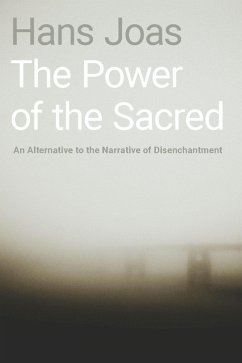
The Oxford Handbook of Cognitive Sociology (eBook, ePUB)
Versandkostenfrei!
Sofort per Download lieferbar
60,95 €
inkl. MwSt.
Weitere Ausgaben:

PAYBACK Punkte
30 °P sammeln!
In recent years there has been a growing interest in cognition within sociology and other social sciences. Within sociology this interest cuts across various topical subfields, including culture, social psychology, religion, race, and identity. Scholars within the new subfield of cognitive sociology, also referred to as the sociology of culture and cognition, are contributing to a rapidly developing body of work on how mental and social phenomena are interrelated and often interdependent. In The Oxford Handbook of Cognitive Sociology, Wayne H. Brekhus and Gabe Igantow have gathered some of the...
In recent years there has been a growing interest in cognition within sociology and other social sciences. Within sociology this interest cuts across various topical subfields, including culture, social psychology, religion, race, and identity. Scholars within the new subfield of cognitive sociology, also referred to as the sociology of culture and cognition, are contributing to a rapidly developing body of work on how mental and social phenomena are interrelated and often interdependent. In The Oxford Handbook of Cognitive Sociology, Wayne H. Brekhus and Gabe Igantow have gathered some of the most influential scholars working in cognitive sociology to present an accessible introduction to key research areas in a diverse field. While classical sociological and newer interdisciplinary approaches have been covered separately by scholars in the past, this volume alternatively presents a broad range of cognitive sociological perspectives. The contributors discuss a range of approaches for theorizing and analyzing the "social mind," including macro-cultural approaches, interactionist approaches, and research that draws on Pierre Bourdieu's major concepts. Each chapter further investigates a variety of cognitive processes within these three approaches, such as attention and inattention, perception, automatic and deliberate cognition, cognition and social action, stereotypes, categorization, classification, judgment, symbolic boundaries, meaning-making, metaphor, embodied cognition, morality and religion, identity construction, time sequencing, and memory. A comprehensive look at cognitive sociology's main contributions and the central debates within the field, the Handbook will serve as a primary resource for social researchers, faculty, and students interested in how cognitive sociology can contribute to research within their substantive areas of focus.
Dieser Download kann aus rechtlichen Gründen nur mit Rechnungsadresse in A, B, BG, CY, CZ, D, DK, EW, E, FIN, F, GR, HR, H, IRL, I, LT, L, LR, M, NL, PL, P, R, S, SLO, SK ausgeliefert werden.













